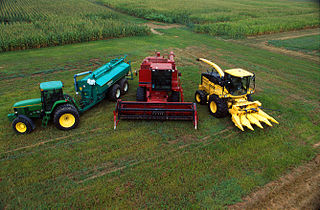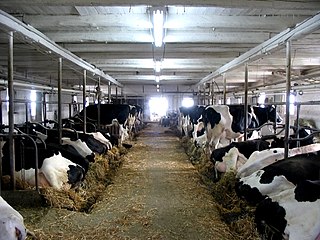
An agricultural subsidy is a government incentive paid to agribusinesses, agricultural organizations and farms to supplement their income, manage the supply of agricultural commodities, and influence the cost and supply of such commodities.

The Ontario Agricultural College (OAC) originated at the agricultural laboratories of the Toronto Normal School, and was officially founded in 1874 as an associate agricultural college of the University of Toronto. Since 1964, it has become affiliated with the University of Guelph, which operates campuses in Guelph and Ridgetown and formerly in Alfred and Kemptville, all in Ontario.

Organic certification is a certification process for producers of organic food and other organic agricultural products. In general, any business directly involved in food production can be certified, including seed suppliers, farmers, food processors, retailers and restaurants. A lesser known counterpart is certification for organic textiles that includes certification of textile products made from organically grown fibres.

Eugene Francis "Gene" Whelan was a Canadian politician, sitting in the House of Commons from 1962 to 1984, and in the Senate from 1996 to 1999. He was also Minister of Agriculture under Pierre Trudeau from 1972 to 1984, and became one of Canada's best-known politicians. During his career, he would meet Queen Elizabeth II, help Canada beat U.S. president Richard Nixon to the punch in "opening up" China, and play a catalyzing role in the fall of the Iron Curtain and the end of the Cold War. In an editorial immediately following his death, the Windsor Star said:
A marketing board is an organization created by many producers to try to market their product and increase consumption and thus prices. It can also be defined as an organization set up by a government to regulate the buying and selling of a certain commodity within a specified area. They most commonly exist to help sell farm products such as milk, eggs, beef or tripe and are funded by the farmers or processors of those crops or products. Marketing boards often also receive funding from governments as an agricultural subsidy. The leadership and strategies of the marketing boards are set through votes by the farmers who are members of the board.
The Foreign Agricultural Service (FAS) is the foreign affairs agency with primary responsibility for the United States Department of Agriculture's (USDA) overseas programs – market development, international trade agreements and negotiations, and the collection of statistics and market information. It also administers the USDA's export credit guarantee and food aid programs and helps increase income and food availability in developing nations by mobilizing expertise for agriculturally led economic growth. The FAS mission statement reads, "Linking U.S. agriculture to the world to enhance export opportunities and global food security," and its motto is "Linking U.S. Agriculture to the World."

National Farmers Union is a national federation of state Farmers Union organizations in the United States. The organization was founded in 1902 in Point, Texas, and is headquartered in Washington, D.C.. The organization was created to protect and enhance the economic well-being and quality of life for family farmers, ranchers, and their rural communities by promoting legislation and education beneficial to farmers, and developing cooperative buying and selling methods and businesses. NFU advocates for the sustainable production of food, fiber, feed, and fuel. The current president is Rob Larew, and the vice president is Jeff Kippley. Former NFU Presidents have included Roger Johnson, Tom Buis, and David Frederickson.

The National Farmers' Federation (NFF) is an Australian non-profit membership–based organization that represents farmers and the agricultural sector in Australia. Historically, NFF was a key player in a number of industrial relations disputes, including Australia's infamous waterfront dispute; the shearing wide comb dispute; and the Mudginberri dispute.

Canada is one of the largest agricultural producers and exporters in the world. As with other developed nations, the proportion of the population agriculture employed and agricultural GDP as a percentage of the national GDP fell dramatically over the 20th century, but it remains an important element of the Canadian economy. A wide range of agriculture is practised in Canada, from sprawling wheat fields of the prairies to summer produce of the Okanagan valley. In the federal government, overview of Canadian agriculture is the responsibility of the Department of Agriculture and Agri-Food.
The Ontario Federation of Agriculture (OFA) is one of three general farm organizations in the province of Ontario that represent the agricultural sector to government, stakeholders and the public. OFA is headquartered in Guelph, Ontario.
In different administrative and organizational forms, the Food for Peace program of the United States has provided food assistance around the world for more than 60 years. Approximately 3 billion people in 150 countries have benefited directly from U.S. food assistance. The Bureau for Humanitarian Assistance within the United States Agency for International Development (USAID) is the U.S. Government's largest provider of overseas food assistance. The food assistance programming is funded primarily through the Food for Peace Act. The Bureau for Humanitarian Assistance also receives International Disaster Assistance Funds through the Foreign Assistance Act (FAA) that can be used in emergency settings.

The Canadian Agricultural Safety Association was established in 1993 in response to an identified need for a national farm safety networking and coordinating agency to address problems of illness, injuries and accidental death in farmers, their families and agricultural workers. Since then, CASA has worked to improve the health and safety conditions of those who live and work on Canadian farms.
The Federation of Sovereign Indigenous Nations (FSIN), formerly known as the Federation of Saskatchewan Indian Nations, is a Saskatchewan-based First Nations organization. It represents 74 First Nations in Saskatchewan and is committed to honouring the spirit and intent of the Numbered Treaties, as well as the promotion, protection and implementation of these promises made over a century ago.

Dairy Farmers of Canada (DFC) is an advocacy group created in 1934, when a number of related groups merged to form a single entity for representing the interests of dairy farmers.
Herbert Henry Hannam was a farm leader, editor, educator and a promoter of the co-operative movement. He was general secretary of the United Farmers of Ontario from 1933 to 1942.

Texas Farm Bureau, Texas's largest farm organization, represents the interests of agricultural producers and rural communities across Texas as the "Voice of Texas Agriculture." Texas Farm Bureau's grassroots structure begins in local communities across the state of Texas. The non-profit organization's direction and decision making are dictated by its members.
Dairy Farmers of Ontario (DFO), is the marketing organization and regulatory body representing over 4,000 dairy farmers in Ontario, Canada. DFO was formerly known as the Ontario Milk Marketing Board (OMMB), which was established as result of the 1965 Ontario Milk Act. On August 1, 1995, the Ontario Milk Marketing Board and the Ontario Cream Producers' Marketing Board merged to form Dairy Farmers of Ontario.

The Louisiana Farm Bureau Federation (LFB) is a state chapter of the United States's largest general farm organization representing farmers, ranchers, and rural residents. The organization provides assistance toward the development and prosperity of Louisiana agriculture. It is a private, non-profit, non-governmental agency established in 1922 to bring a voice to Louisiana farmers and their families. It is based in Baton Rouge, Louisiana.

Canada's supply management, abbreviated SM, is a national agricultural policy framework used across the country, which controls the supply of dairy, poultry and eggs through production and import controls and pricing mechanisms. The supply management system was authorized by the 1972 Farm Products Agencies Act, which established the two national agencies that oversee the system. The Agriculture and Agri-Food Canada federal department is responsible for both the Canadian Dairy Commission and its analogue for eggs, chicken and turkey products, the Farm Products Council of Canada. Five national supply management organizations, the SM-5 Organizations — Egg Farmers of Canada (EFC), Turkey Farmers of Canada (TFC), Chicken Farmers of Canada (CFC), the Canadian Hatching Egg Producers (CHEP) and the Ottawa-based Canadian Dairy Commission (CDC), a Crown corporation — in collaboration with provincial and national governing agencies, organizations and committees, administer the supply management system.
Keystone Agricultural Producers (KAP) is Manitoba’s largest general farm policy organization, responsible for representing the interests of all Manitoba farmers. Their membership includes direct paying farmer and farm commodity groups. KAP is one of the province's most active lobby groups and is a member organization of the Canadian Federation of Agriculture.












